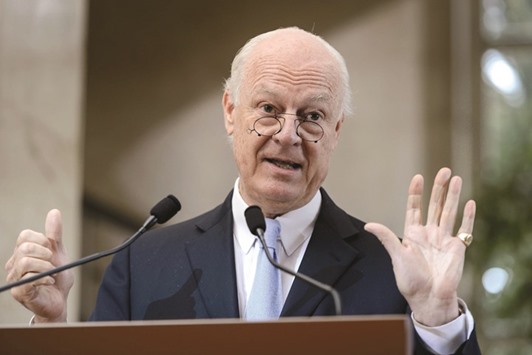Syria’s ceasefire has shown clear signs of progress, the top UN envoy for the war-ravaged country said yesterday, but warned there was no guarantee it would succeed.
“The situation... on the ground could be summarised as fragile. Success is not guaranteed, but progress has been visible,” Staffan de Mistura told reporters in Geneva as the cessation of hostilities entered its sixth day.
The ceasefire brokered by the US and Russia came into effect on Saturday but does not include territory controlled by the Islamic State group or Al Nusra.
“The level of violence in the country is being reduced. Ask the Syrian people,” de Mistura said.
His comments came shortly before entering a meeting of a UN-backed international task force co-chaired by Moscow and Washington that is overseeing the truce.
“In general, the cessation has been holding,” he said, while acknowledging that “there are still a number of places where fighting has continued,” including in parts of Damascus and Homs.
But the good thing, he stressed, is that incidents of fighting “have been contained”.
As a result of the relative calm, aid workers have been delivering desperately-needed assistance to besieged areas where nearly half a million people are trapped.
Another 4mn people are living in hard-to-reach areas.
Following a meeting of the task force overseeing the delivery of humanitarian aid, de Mistura’s special advisor Jan Egeland voiced hope that the ceasefire would “lead to a big leap forward... in reaching many hundreds of thousands more people.”
“Considering how it has been, we are obviously making great progress, but there is a lot left to be done,” he said.
In the last three weeks, 236 trucks had been sent out to 115,000 people in besieged areas, he said, adding that by the weekend, aid workers were hoping to have reached another three or four areas in Kfar Batna in the Eastern Ghouta region, which are home to another 20,000 people.
De Mistura has said a new round of peace talks will resume in Geneva on March 9, after his first attempt to engage the warring parties in indirect negotiations floundered last month.
He had been hoping to get started on March 7, but acknowledged that logistical problems, such as finding hotel rooms for participants as the Swiss city hosts one of the world’s biggest car shows, had forced him to push the talks back.
Since the talks would consist of indirect “proximity talks”, participants would not all need to arrive by March 9, with some expected to arrive as late as March 14, he said.

UN Syria envoy Staffan de Mistura gestures while speaking to the media yesterday in Geneva.
